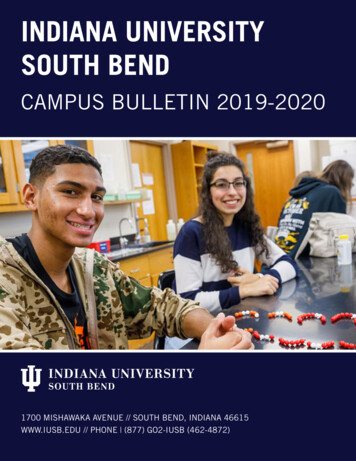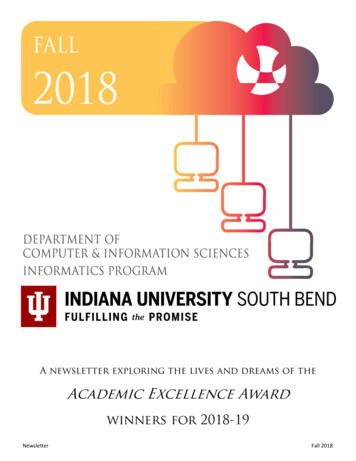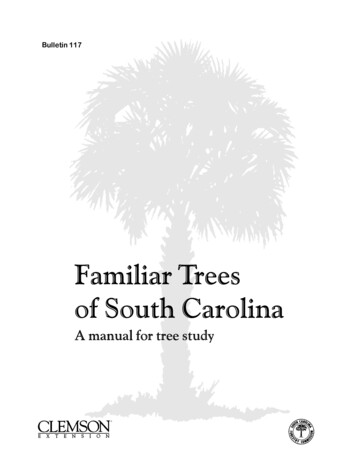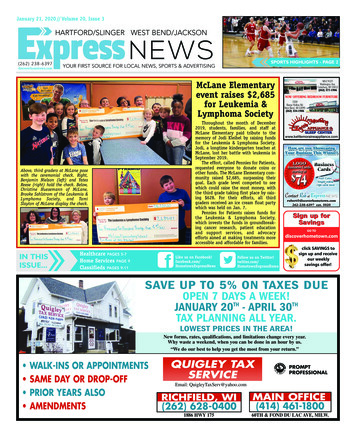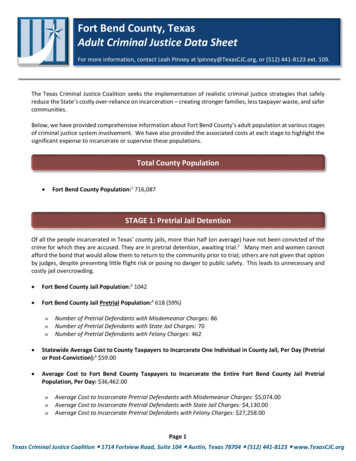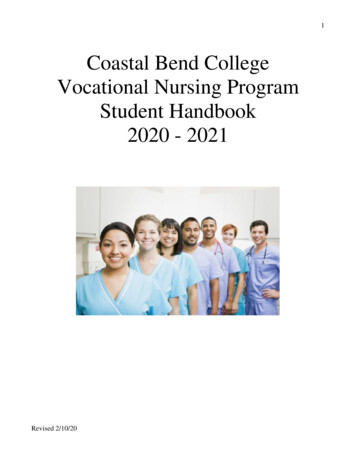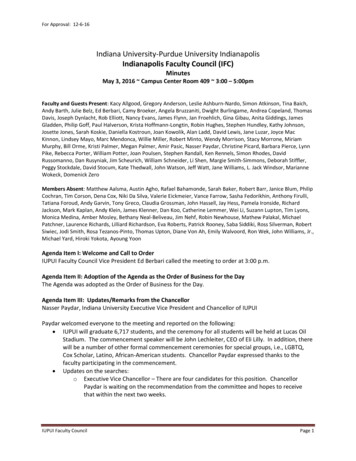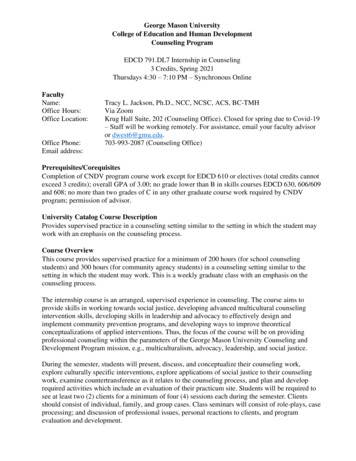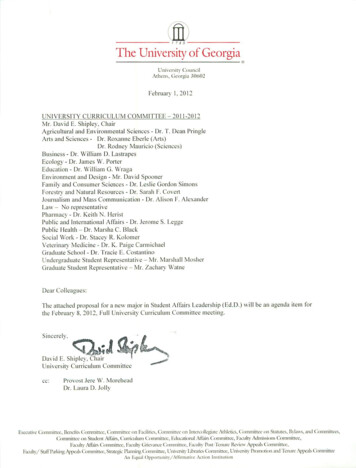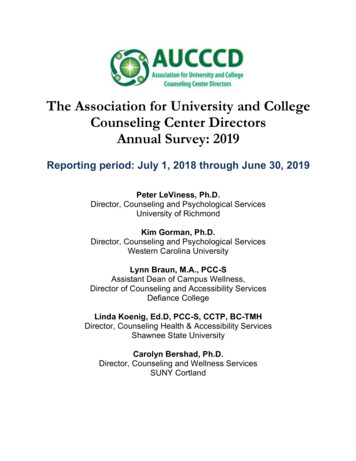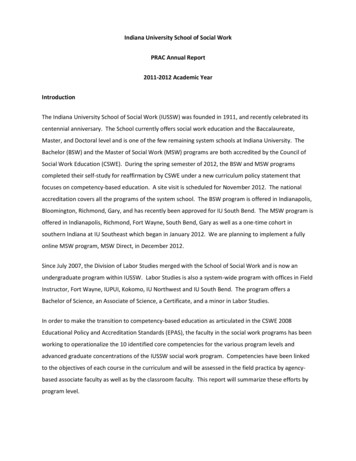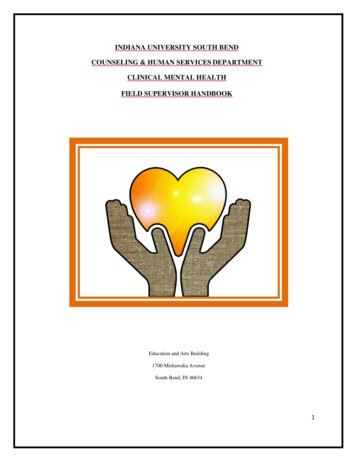
Transcription
INDIANA UNIVERSITY SOUTH BENDCOUNSELING & HUMAN SERVICES DEPARTMENTCLINICAL MENTAL HEALTHFIELD SUPERVISOR HANDBOOKEducation and Arts Building1700 Mishawaka AvenueSouth Bend, IN 466341
Table of ContentsINTRODUCTION . 3PROGRAM OBJECTIVES . 6Clinical mental health Internship Requirements . 14Responsibilities of the On-Site Supervisor. 18Techniques in Supervision . 20Practicum and Internship Course Forms . 26Practicum/Internship Agreement . 30Practicum/Internship Group Supervision Format . 34Evaluation of Clinical mental health Practicum/Internship Site . 40Practicum/Contract Format . 42Example of A Client Release Form . 43Example of a Parent Release Form . 442
INTRODUCTIONThe Practicum/Internship is a capstone experience for Clinical mental health students.This experience provides opportunities for application and integration of knowledge and skills.Your involvement with the Practicum/Internship program provides an important service to theprofession and the counseling intern. The Field Supervisor’s Handbook is designed to serve as aguide for you as a counseling intern supervisor.The objectives of the Practicum/Internship experience reflect the training standards as setforth by the Indiana Professional Licensing Board and the Council for Accreditation ofCounseling and Related Educational Programs (CACREP). The counseling intern’s progressshould be based on the satisfactory completion of the listed objectives. Before certification allcandidates must demonstrate knowledge and skill at the initial level as described within theIndiana Counselor Standards for Licensing.The CHS clinical mental health program is a full-time three-year cohort program.During their second year, the Clinical mental health practicum students complete a 200 hourpracticum. As part of this practicum, the supervisors conduct the following activities withstudents: (1) individual counseling, (2) individual assessment, (3) group counseling, and (4)large group guidance presentations. However, the primary practicum training areas areindividual and group counseling. Also, the student is expected to start getting familiar with allaspects of the site Clinical mental health program.During the third year, the Clinical mental health students complete a 600-hour internship.As part of the internship, supervisors oversee the students’ activities in (1) individual and groupcounseling, (2)marriage and family counseling, (3) children, adolescents and adults and othersite specific areas in Clinical mental health. It is expected the internship will provideexperience in all areas of the lifespan.COUNSELOR EDUCATION PROGRAMThe Counselor Education Program at Indiana University South Bend is committed to theselection, training, supervision, and professional success of counseling students, in keeping withthe high standards established by the Council for the Accreditation of Counseling and RelatedEducational Programs (CACREP).At its May 2019 commencement, Indiana University South Bend (IUSB) awarded Masters ofScience Degrees in Education -Counseling & Human Services-to members of its 41st graduatingclass. Throughout the past four decades, IUSB’s Counseling & Human Services (CHS) Programhas prepared professional counselors who have contributed significantly to the communities ofNorth Central Indiana, Southwestern Michigan, and beyond. The respect and admiration earnedby our alumni in their professional endeavors demonstrate the CHS Program’s sustainedcommitment to excellence in fulfilling its educational mission.3
Indiana University South Bend is fully accredited by the North Central Association for Collegesand Schools. Our School of Education and the Counseling & Human Services Program are bothfully accredited by the National Council for Accreditation of Teacher Education and by theIndiana State Department of Education. Our CHS program is accredited by the Council for theAccreditation of Counseling and Related Educational Programs (CACREP).CHS MISSION STATEMENTThe mission of the IUSB CHS Program is to prepare knowledgeable, ethical, and multi-culturallycompetent school counselors and clinical mental health counselors.Faculty members embody a wide diversity of experience and provide students with a rigorousexploration of theoretical perspectives and evidence-based practices in an environment thatpromotes personal growth and reflection. Graduates exemplify the learning, skills training, anddispositions that reflect both career readiness and the highest standards of the counselingprofession.OVERVIEW OF CHS PROGRAMThe Indiana University South Bend Counselor Education Program reflects current knowledgeof effective counseling practices within a rapidly changing society. Students acquire knowledgeand skills in counseling theories and techniques, human development, Clinical mental healthsystems, career development, family dynamics, and community resources. Students gain anawareness of social changes and the impact of these changes on students and clients. Specialemphases are placed on ethical and legal issues, social justice advocacy, grant writing, thetreatment of substance abuse and addiction, suicide prevention and intervention, understandingand prevention of violence and abuse, and other contemporary social problems.A cooperative relationship between a counselor education program and the internship siteallows for sharing of ideas and resources. The supervision of the counseling intern is one of theopportunities for these institutions to work together.4
APPRECIATIONDear:We would like to take this time to thank you for your commitment and dedication to thecollaborative training and supervision of our student/intern. Without you, we would not be able toprovide our students the experiences that are required for them to become competent clinicalmental health counselors.We want to welcome you as part of the CHS Program. We will provide you with as much supportas possible in order for you to perform your supervisory responsibilities.We are fully aware of the time commitment of supervising students/interns, so please do nothesitate to reach out to us for any resources.Sincerely,Dr. Yvonne Larrier, PhD, LPC, NCC, NCSCAssociate Professor & Department ChairCounseling & Human ServicesIndiana University South Bendylarrier@iusb.edu574-520-42265
PROGRAM OBJECTIVESThe objectives of the CHS Program are to:1. Provide a fertile learning and professional development environment for intellectuallytalented and interpersonally responsive students that represent a diverse and pluralisticsociety;2. Provide curricular experiences reflecting CACREP preparation standards for studentswho are expected practice professionally in an increasingly multicultural societycharacterized by rapid social and economic change;3. Develop effective clinicians with the skills and abilities to work within a wide range ofsettings;4. Provide quality integrated didactic and clinical instruction;5. Acquaint students with the technology available through the School of Education forresearch, training, professional development, and the delivery of services;6. Provide a technologically sophisticated facility for the practice of counseling, assessment,and supervisory skills.7. Identify, evaluate, and select sites which will provide quality field experiences;8. Include faculty, current and former students, and personnel in cooperating agencies in aregular evaluation of the program, including a review of program curricular objectives;9. Provide students with knowledge and conviction in ethical standards and practice; and10. Provide a unique program experience through such features as cohort groups, supportgroups, close clinical supervision, and professional and networking functions.The CHS Program faculty works with each student throughout their program of study to achievethe following educational goals:1. Professional Identity – Students will develop a professional identity.2. Social and Cultural Diversity – Students will acquire the skills and dispositions to beeffective counselors in a multicultural society.3. Human Growth and Development – Students will utilize the principles of human growthand development in their counseling activities.4. Career Development – Students will acquire the skills to provide career developmentcounseling.5. Helping Relationships – Students will acquire the skills for a therapeutic helpingrelationship.6. Group Work – Students will acquire group work skills.7. Assessment – Students will acquire individual and group assessment skills.8. Research and Program Development – Students will acquire research and evaluation skills.6
Clinical Mental Health Counseling 2016 CACREP StandardsStudents who are preparing to specialize as clinical mental health counselors will demonstrate theknowledge and skills necessary to address a wide variety of circumstances within the context ofclinical mental health counseling. Counselor education programs with a specialty area in clinicalmental health counseling must document where each of the lettered standards listed below is coveredin the curriculum.1. FOUNDATIONSa) history and development of clinical mental health counselingb) theories and models related to clinical mental health counselingc) principles, models, and documentation formats of biopsychosocial case conceptualization andtreatment planningd) neurobiological and medical foundation and etiology of addiction and co-occurring disorderse) psychological tests and assessments specific to clinical mental health counseling2. CONTEXTUAL DIMENSIONSa. roles and settings of clinical mental health counselorsb. etiology, nomenclature, treatment, referral, and prevention of mental and emotionaldisordersc. mental health service delivery modalities within the continuum of care, such asinpatient, outpatient, partial treatment and aftercare, and the mental health counselingservices networksd. diagnostic process, including differential diagnosis and the use of current diagnosticclassification systems, including the Diagnostic and Statistical Manual of MentalDisorders (DSM) and the International Classification of Diseases (ICD)e. potential for substance use disorders to mimic and/or co-occur with a variety ofneurological, medical, and psychological disordersf. impact of crisis and trauma on individuals with mental health diagnosesg. impact of biological and neurological mechanisms on mental healthh. classifications, indications, and contraindications of commonly prescribedpsychopharmacological medications for appropriate medical referral and consultationi.legislation and government policy relevant to clinical mental health counselingj.cultural factors relevant to clinical mental health counseling7
k. professional organizations, preparation standards, and credentials relevant to thepractice of clinical mental health counselingl.legal and ethical considerations specific to clinical mental health counselingm. record keeping, third party reimbursement, and other practice and management issuesin clinical mental health counseling3. PRACTICEa. intake interview, mental status evaluation, biopsychosocial history, mental healthhistory, and psychological assessment for treatment planning and caseloadmanagementb. techniques and interventions for prevention and treatment of a broad range of mentalhealth issuesc. strategies for interfacing with the legal system regarding court-referred clientsd. strategies for interfacing with integrated behavioral health care professionalse. strategies to advocate for persons with mental health issues8
The Counseling Practicum CourseThe practicum course (G524: Practicum in Counseling) is the first field experience required for CHSstudents, and is the initial opportunity for students to synthesize theoretical information from theircoursework and apply it directly with clients. This course takes place under the training and supervision ofdepartment faculty as well as the clinical supervision of site supervisors. Clinical mental health studentswill see clients in a variety of settings and agencies. Students are responsible for locating their ownpracticum sites but may solicit suggestions and guidance from CHS field coordinator and faculty.Classes meet weekly for 2.5 hours of group supervision. Students may also have one hour ofindividual or triadic supervision each week at a time arranged by the instructor and the student(s).CHS faculty require supervisees to be exposed to diverse and varied experiences as much as it is possible.Ideally, students will work with different faculty supervisors. It is also preferable and encouraged thatstudents work in different placements for each field experience, whenever possible. This is less of a concernif the placement offers a wide range of diversity in clients, counseling issues, and services. Be aware someplacements require a year- long commitment, such as the IUSB Counseling Center.Practicum Sites: Students are to locate their own practicum sites, working closely with CHS FieldPlacement Coordinator. Once located, be sure to get approval from the individual who is at the highestlevel of authority and responsibility at your setting.It is also desirable to have a back-up site available: For various reasons, a student may find their site cannotfulfill their commitment, or the student may have difficulty obtaining the hours necessary to meet courseand CACREP requirements. Therefore, an additional site may be required.Class Sessions (small group supervision): During group supervision, students benefit from facultyand peer supervision and feedback. Students are also expected to discuss other relevant issues thatarise in their practicum setting. Reviewing tapes of counseling sessions, role playing, presentingclient conceptualizations, learning and sharing information about community resources, discussinghow to work effectively with diverse cultures, sharing and practicing counseling techniques, andevaluating relevant legal and ethical issues are examples of seminar activities.Faculty Expectation for Practicum:1. Students will turn in all weekly reports, including logs for review. This allows for relevant andeffective feedback.2. Students are to attend all scheduled classes and supervisory sessions. Participation is imperative asthis is the primary method for gaining knowledge, skills and insight as a counselor.3. All agreements between agencies, contracts, students and IUSB must be turned in to your IUSBsupervisor before counseling sessions could begin.9
4. Proof of liability insurance must be turned in to your IUSB supervisor before counseling sessions couldbegin.Insurance: Students commonly acquire their liability insurance through their membership in theAmerican Counseling Association (http://www.counseling.org) or Check their websites for moreinformation.Forms and procedures that elaborate on the practicum experience and outline the specificrequirements of G524 are included in the Appendix.10
Practicum Course DescriptionsG524: Practicum in Counseling (3 cr.)Prerequisites: CHS Faculty Approval. Intensive supervision of the Practicum counseling practice withclients in approved field sites in schools or community agencies. Additional fee required.Purpose of the PracticumThe Practicum provides an opportunity for students to apply clinical counseling skills, under closesupervision, in a real life work environment. As a part of the practicum the student will be expected to:1. Practice skills learned in previous course work;2. Receive feedback from instructor and peers on his/her level of effectiveness in a helpingrelationship;3. Share clinical counseling experiences with others in a supportive setting;4. Learn what problems others are encountering and what solutions could be considered;5. Share techniques that are promising;6. Work with a variety of clients and presenting problems;7. Experience those characteristics that are unique to different settings; e.g., schools, businesses andagencies;8. Relate theory to practice;9. Begin the formulation of an applied theory of counseling;10. Research areas of professional interest;11. Work in an ethical and professional manner; and12. Work toward professional certification/licensure requirements.In addition to providing actual counseling experiences for the student, it is anticipated that the practicumwill help meet the needs of community businesses, schools and agencies by providing well-trainedstudents who can perform a variety of human service duties.Practicum Requirements(The guidelines for minimum hours have been developed in accordance with CACREP standards for yourclinical practicum experience.)11
1. 200 CLOCK HOURS at your practicum site. This averages out to about one day full-time per week, butmay be acquired in smaller increments.2. 40 DIRECT SERVICE HOURS. This is a requirement of the state and CACREP. Direct hours areconsidered face-to-face interaction with client(s), or other personnel in a counseling or consultation role.These hours are commonly acquired through individual and group counseling, but some hours may also beaccumulated through staffings, conferences with student/client/parent/case worker, etc. as well as classroomcounseling instruction. Assessments of clients or students would also be considered direct service hours.Practicum students may acquire more than 40 hours of direct service time, but 40 hours is the minimum.Any additional direct hours can then be added to the total of 200 clock hours, thus reducing the number ofindirect hours needed.a. Each student will present a predetermined number of taped counseling sessions. These tapes may bereviewed in individual or group supervision.b. ALL TAPED SESSIONS MUST BE ERASED, RECORDED OVER, ORDESTROYED AFTER THEY HAVE BEEN USED IN SUPERVISION.3. INDIRECT SERVICE HOURS. These are hours spent on site, but not directly working with clients,students or other personnel. Paperwork, case notes and record keeping are examples of indirect servicehours. Observations, such as observing a session also count as indirect hours. Any training acquired at thesite fall under indirect hours (e.g., orientation, child abuse training) and scoring assessments and writingreports also qualify as indirect service hours.4. CACREP requires that site supervisors have:a. a minimum of a master’s degree in counseling or a related profession with equivalent qualifications,including appropriate certifications and/or licensesb. a minimum of two(2) years of pert
Educational Programs (CACREP). At its May 2019 commencement, Indiana University South Bend (IUSB) awarded Masters of Science Degrees in Education -Counseling & Human Services-to members of its 41st graduating class. Throughout the past
